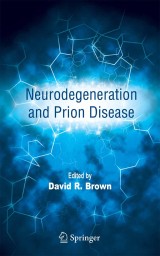Details

Neurodegeneration and Prion Disease
|
149,79 € |
|
| Verlag: | Springer |
| Format: | |
| Veröffentl.: | 26.07.2005 |
| ISBN/EAN: | 9780387239231 |
| Sprache: | englisch |
| Anzahl Seiten: | 316 |
Dieses eBook enthält ein Wasserzeichen.
Beschreibungen
<P>This is the first and only book on the subject of prions to cover the cause of cell death in the disease. It covers the full range of competing theories on the subject, from broad description and basic points up to the final details of the basic science. </P>
David R. Brown Department of Biology and Biochemistry, University of Bath, Bath BA2 7AY, UK In 1982 Stanley Prusiner and colleagues puri?ed an abnormal protein from the brains of mice experimentally infected with a rare sheep dis- 1 ease called scrapie . This protein was called the prion protein. Earlier work had suggested that this diseases and others, loosely collected - gether as transmissible spongiform encephalopathies (TSEs), were not transmitted by conventional infectious agents. Prusiner suggested that 2 this new protein was the infectious agent in these diseases . Such a contentious suggestion lead to ferocious debate. Many researchers still maintained that there was no such thing as an infectious protein. - spite this, by 1990 most people accepted that the cause of the TSEs was the abnormal isoform of the prion protein his research group had id- ti?ed. The most convincing evidence for this had come from the work of Charles Weissmann, whose prion protein knockout mice could not be infected because they lacked expression of the protein that was now 3,4 forever linked to these disease . Since then it has become more widely accepted for these diseases to be termed prion diseases. In 1997 when 5 Stanley Prusiner won the Nobel Prize for his work on prion diseases . Even then, there was still an element of resistance in the scienti?c c- munity. It was considered that, in order the transmissible agent to truly be a protein only, the protein would have to be generated from a rec- binant source.
Neuropathology of transmissible spongiform encephalopathies (prion diseases).- Central pathogenesis of prion diseases.- Hereditory prion protein Amyloidoses.- Mouse behavioural studies and what they can teach us about prion diseases.- Electrophysiological approaches to the study of prion diseases.- Prion protein, prion protein-like protein, and neurodegeneration.- Oxidative stress and mitochondrial dysfunction in neurodegeneration of transmissible spongiform encephalopathies (TSEs).- Mechanisms of prion toxicity and their relationship to prion infectivity.- A stone guest on the brain: Death as a prion.- Molecular mechanisms mediating neuronal cell death in experimental models of prion diseases, in vitro.- Processing and mis-processing of the prion protein: Insights into the pathogenesis of familial prion disorders.- Signaling pathways controling prion protein neurotoxicity: Role of endoplasmic reticulum stress-mediated apoptosis.- Cell culture models to unravel prion protein function and aberrancies in TSE.- Insights into the cellular trafficking of prion proteins.- The molecular basis of prion protein-mediated neuronal damage.
<P>David Brown has worked in the field of prion disease or TSEs for over ten years. He was born in Australia but spent part of his early child-hood in the United Kingdom. After returning to Australia he completes his schooling in Sydney and attended Sydney University. There he completed a Bachelor of Science degree in biochemistry, a Master of Science degree in neurobiology and a Doctor of Philosophy degree also in Neuroscience. His initial research interests included neuronal growth factors and topographic innervation of toad muscle. Following three years of postdoctoral research, Dr. Brown left Australia in 1994. Since then he has worked in the Albert Einstein College of Medicine in New York, the Department of Neuropathology in Göttingen and the Department of Biochemistry at the University of Cambridge. His interest in prion began during his four years researching in Germany. After returning to work in the United Kingdom to work at Cambridge, Dr. Brown established his own independent research group that quickly gained international recognition. In parallel with research focusing on the function of the prion protein and mechanisms of cell death in neurodegeneration, Dr. Brown’s research has also investigated basic aspects of cellular neurobiology including the nature of the interactions between neurones and glial cells. David Brown is currently a Reader in Biochemistry at the University of Bath and his research continues to reap international recognition and acclaim. He is also a member of the Spongiform Encephalopathy Advisory Committee that advises the UK government on issues to do with BSE and variant CJD.</P>
<P>This volume provides an in-depth overview from world experts on prion disease. These fatal diseases include Creutzfeldt-Jakob disease, chronic wasting disease in deer, scrapie of sheep, bovine spongiform encephalopathy (mad cow’s disease) of cattle and related diseases. Understanding what causes neuronal death in these diseases is essential to both preventing and curing them. The most recent advances in understanding neuronal death in prion diseases are presented. Prion diseases serve as an experimental model for all neurodegenerative conditions. This book will provide understanding of neurodegeneration and provide an up-to-date record of the state of the art for other specialists and non-specialists in related fields.</P>
<p>First and only book on the subject of prions to cover the cause of cell death in the disease</p><p>Covers the full range of competing theories on the subject, from broad description and basic points up to final details of the basic science</p><p>Includes supplementary material: sn.pub/extras</p>

















